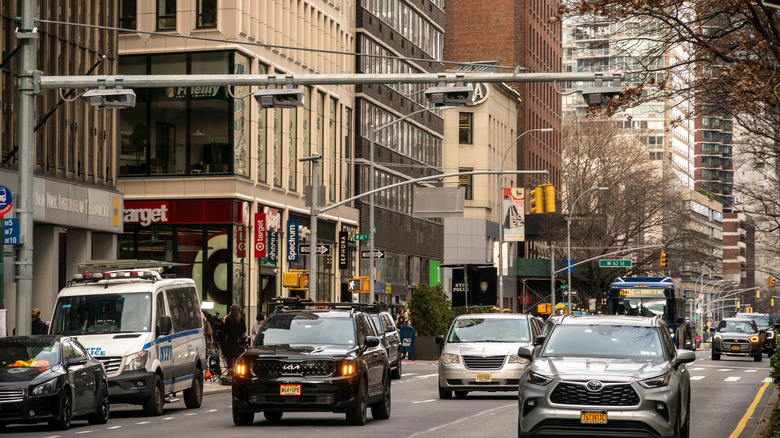
As the world's leading diplomats converge in New York City for the United Nations General Assembly this week, we're reminded of how their vehicles effectively have free rein over the streets due to diplomatic immunity. While delegations are exempt from newly imposed congestion charges in the Big Apple, it's a different story in Britain's capital. Embassies collectively owe $217.4 million in congestion charges to Transport for London, and if leaving fees unpaid were an Olympic sport, the United States would have a stack of gold medals.
The Congestion Charge Zone was established in Central London in 2003. Cars are tracked using automatic plate readers and drivers can only be charged once per day. Drivers must pay a £15 ($20) fee if they drive into the zone between 7:00 a.m. and 6:00 p.m. during weekdays. The charge is still enforced during weekends, but with a noon start time. The only time of year when drivers aren't charged is in late December between Christmas and New Year's Day.
Guidelines established by the Vienna Convention exempt diplomats from paying taxes to host countries. However, TfL states that the congestion charges aren't taxes but payments for a service. While the agency's stance makes sense because it's a privilege to drive a vehicle to the middle of one of the world's largest cities, diplomats disagree. TfL data shows that 145 countries owe unpaid congestion charges. The agency claims that the majority of embassies in London pay their charges, but it doesn't mathematically make any sense. There are 195 members of the United Nations, meaning there are only 30 UN-recognized states that don't owe TfL money.
 rblfmr/Shutterstock
rblfmr/Shutterstock
It might not be a competition to build the largest debt to London possible, but the United States is first by a country mile. The American embassy owes $21.1 million to TfL. In a distant second place, Japan owes $14.5 million to London's transport agency. New York decides to avoid becoming an international debt collector altogether. When the city's congestion pricing program took effect earlier this year, diplomats were exempt from the fees. According to the Guardian, diplomats posted in New York owed $15.7 million in parking tickets. The figure would have ballooned if diplomatic vehicles were subject to congestion pricing, not to mention the cost of tracking all of the debt that would likely never be paid.
Despite diplomats being exempt, congestion pricing in New York has been an undisputed success. In a June report, the Regional Plan Association found that traffic congestion is down around the city, both within and outside the zone. Along with the better traffic, the MTA is on track to generate $500 million in revenue this year to improve public transportation. The only part of the city unaffected by the changes is Staten Island. Once again proving that Staten Island really isn't a part of New York City.














